Alabama civil asset forfeiture law and process upheld by SCOTUS
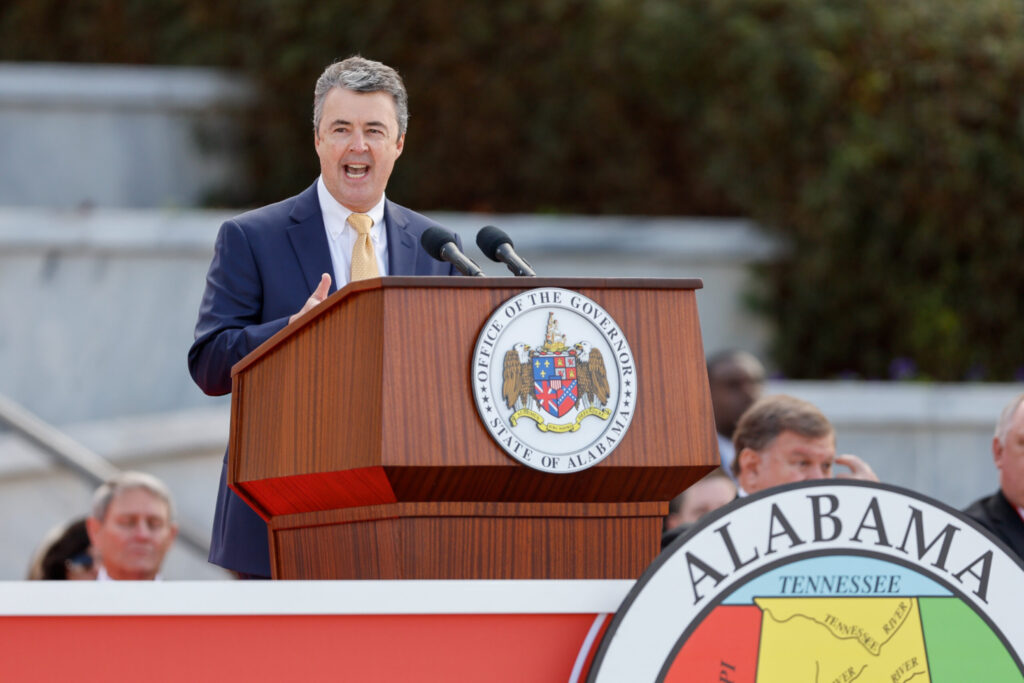
Attorney General Steve Marshall applauded the U.S. Supreme Court’s 6-3 opinion protecting the traditional law enforcement power to seize contraband and the proceeds and instrumentalities of crime. Alabama Solicitor General Edmund LaCour argued the case Culley v. Marshall in the Supreme Court on October 30, 2023. In a statement, Marshall said, “The U.S. Supreme Court affirmed our previous victories in these cases. Law enforcement officers across Alabama work hard every day to keep their fellow citizens safe while respecting their constitutional rights. And the Court confirmed that those rights were respected.” The two plaintiffs had each loaned their cars to men who were stopped and arrested when Alabama police found controlled substances in their cars. According to court documents, “The State of Alabama filed a forfeiture complaint against Halina Culley’s car on February 27, 2019, just 10 days after the seizure of the car. But Culley waited six months before answering that complaint. And she waited another year—until September 21, 2020—before raising an innocent owner defense in a motion for summary judgment. Soon thereafter, on October 30, 2020, an Alabama state court granted Culley’s motion and ordered the return of her car. Lena Sutton similarly moved slowly in her forfeiture proceeding. Alabama brought a forfeiture case against Sutton’s car on March 6, 2019, just 13 days after the seizure of the car. Sutton initially failed to appear in the case, causing the state court to enter a default judgment for Alabama. Sutton later requested that the state court set aside that judgment, and the state court did so. Sutton then submitted a brief answer and served discovery requests on Alabama, but Sutton otherwise took no action until the state court set a date for the forfeiture trial. On April 10, 2020, three weeks before the scheduled trial date, Sutton finally moved for summary judgment on the ground that she was an innocent owner. Soon thereafter, on May 28, 2020, the state court granted her motion, and she recovered her car” The Attorney General’s office noted, that under Alabama law, “vehicles used to facilitate the transportation of controlled substances may be forfeited upon proper process. But if the owner of a seized vehicle is found to be innocent at a hearing, the property is returned. In these cases, the plaintiffs had access to the full protections of the judicial system within days. Still, they claimed a constitutional right to yet another hearing, which Alabama argued ‘would interfere with important law-enforcement activities” and risk property being “removed, destroyed, or put to illegal use.’ Justice Brett Kavanaugh’s majority opinion agreed with Alabama’s understanding of the Due Process Clause and affirmed the decision of the U.S. Court of Appeals for the Eleventh Circuit, dismissing the case.” In his statement, Marshall thanked the team who successfully litigated these cases from the district court to the Supreme Court, including Solicitor General Edmund LaCour, Deputy Solicitor General Robert Overing, Assistant Chief Deputy Attorney General Brad Chynoweth, and Assistant Attorney General Brenton Smith.
Bradley Byrne: Religious Freedom is Worth Defending
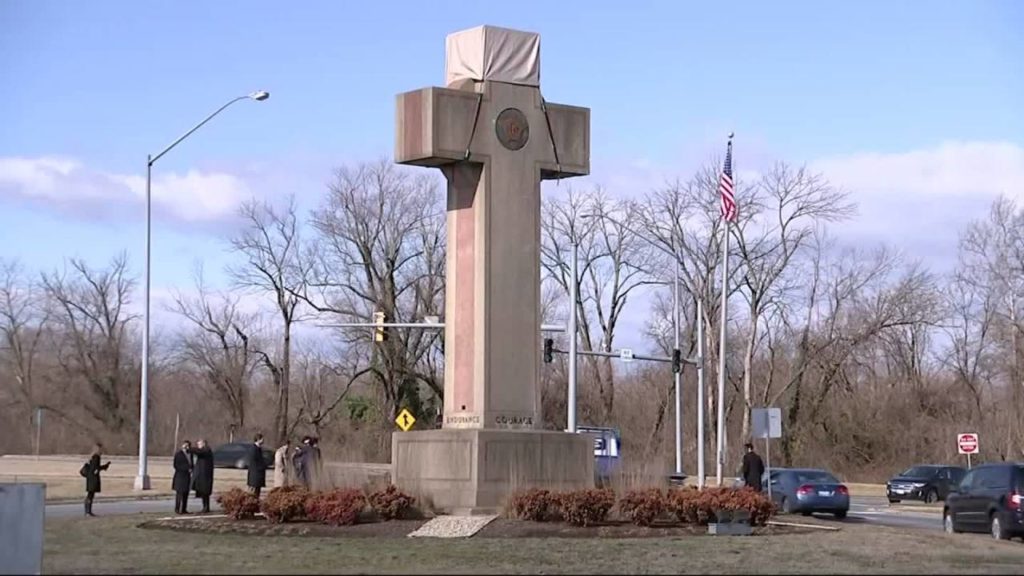
Last week the Supreme Court ruled on an important case with significant implications for the future of religious expression in our republic. The case, American Legion v. American Humanist Association, was brought by a nonprofit atheist organization seeking to remove an almost 100-year-old monument in Maryland’s Prince George’s County. The 40-foot granite and cement cross, called the Bladensburg Peace Cross, was built on public land and paid for by local families, businesses and the American Legion in 1925. It has stood in memory of local residents who died in World War I for almost a century. A state commission now owns the land and pays for its upkeep. On its face, the claims made by the American Humanist Association that the Bladensburg Peace Cross represents an unconstitutional endorsement of religion do not seem legitimate or offered in good faith. While the cross unquestionably has origins as a Christian symbol, for centuries it has also represented memorialization, remembrance and respect for the dead at cemeteries, parks and public spaces around the world. Justice Neil Gorsuch, President Donald Trump’s first choice for the Supreme Court in 2017, wrote that he would have dismissed the case, saying that the challenger’s claim to be offended by the sight of the monument did not hold legal merit. But the Court chose to issue a ruling and rejected the out-of-state organization’s legal arguments that the memorial cross located just outside of Washington, DC represented an endorsement of religion that violated our Constitution. In a 7 to 2 decision, the Court ruled that the cross may continue to stand on public land. Justice Samuel Alito, recognizing that a court-ordered removal of the cross would be the true violation of the Constitution, wrote in the main opinion that “tearing down monuments with religious symbolism and scrubbing away any reference to the divine will strike many as aggressively hostile to religion. “…[D]estroying or defacing the Cross that has stood undisturbed for nearly a century would not be neutral and would not further the ideals of respect and tolerance embodied in the First Amendment.” The Court’s decision was met with cheer and relief in Prince George’s County where the Bladensburg Peace Cross enjoys broad support. The ruling “ensures that this memorial — a dignified tribute to those who came before us and made the ultimate sacrifice — will stand tall and proud for the ages,” Republican Governor Larry Hogan said. Thankfully, we live in a country of religious freedom where no one is forced to practice religion but can practice any religion they choose. That is one of our most fundamental freedoms as Americans. What cases like these are truly about is undermining religion. Lawsuit-happy groups like the American Humanist Association and the Freedom From Religion Foundation seek to advance their own agenda by making it more difficult for Christians and believers of other religions to publicly practice and share their faith. With the rise of these lawsuits, it is more important than ever that we place jurists on our courts who will adhere to our Constitution and protect our religious liberties. Regrettably, these attacks on religious freedom are taking place in Congress too. Last month, Democrats passed the so-called Equality Act which included an explicit carveout of Religious Freedom Restoration Act (RFRA) protections. It was only a few decades ago that Democrats Chuck Schumer and Ted Kennedy shepherded this legislation through Congress, but times and the Democrats have changed. Just this week, the Committee on Education and Labor, on which I sit, has focused its attention on the “misapplication” of RFRA. I see this for what it is: an attempt to undermine our religious freedoms. Our Constitutional protections are worth defending, and I pledge to continue the fight. Congressman Bradley Byrne is currently serving his fourth term in the U.S. House of Representatives, was born and raised in Mobile.
Ruth Bader Ginsburg returns to Supreme Court bench in public session on Alabama-based case
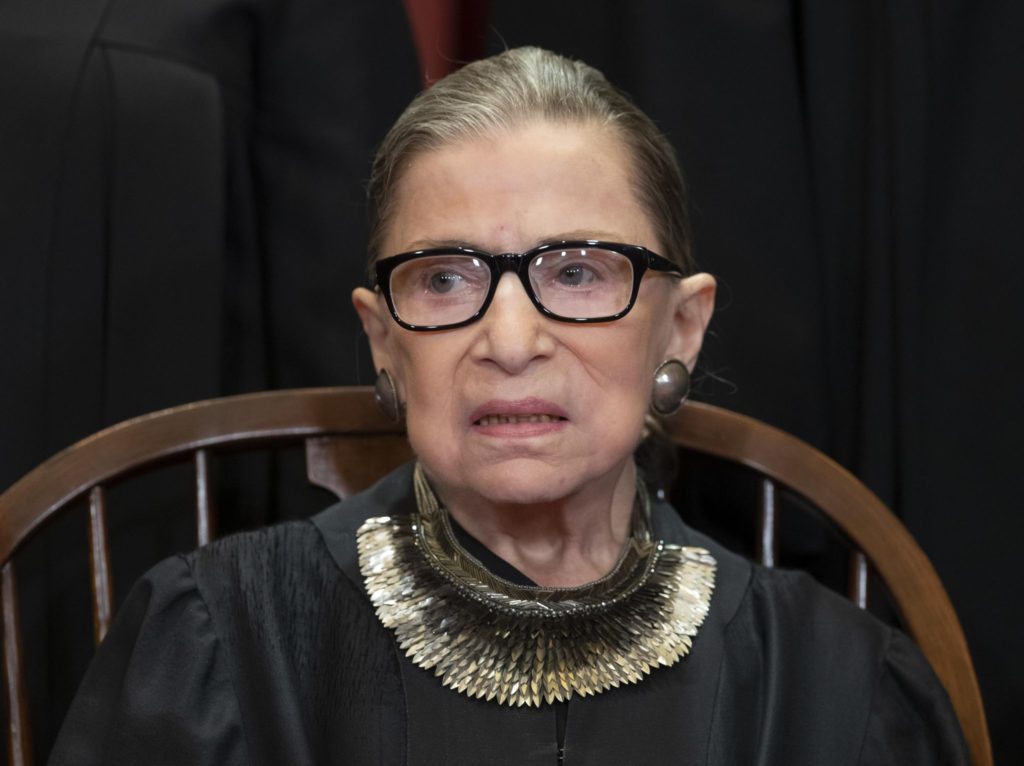
Justice Ruth Bader Ginsburg was back on the Supreme Court bench on Tuesday, eight weeks after surgery for lung cancer. Wearing her customary black robe and ornamental collar, the 85-year-old justice walked unassisted to her seat beside Chief Justice John Roberts when the court began its public session. Ginsburg smiled as the justices stood before taking their seats, but no mention was made in the courtroom of the fact that she was returning after an absence. As she often does, Ginsburg asked the first question during the hourlong argument, and nothing about her appearance or demeanor seemed out of the ordinary. She went on to speak about a half dozen times. The case the court was hearing involves a 2011 patent law, the Leahy-Smith America Invents Act, with the justices being asked to answer whether the United States Postal Service counts as a “person” under the law. Ginsburg’s first question was to attorney Beth Brinkmann, who was arguing for Alabama-based Return Mail Inc. The company owns a patent that was invalidated after a challenge by the Postal Service. Ginsburg wanted clarity on Brinkmann’s argument in the case. Later, Ginsburg asked attorney Malcolm Stewart, arguing for the government on behalf of the Postal Service, why it would be that the government is treated differently under the law, with the government getting “two bites of the apple” while “everybody else gets just one.” It was not clear how the case would come out, with both liberal and conservative justices seeming unsatisfied by arguments on both sides. Ginsburg had returned to the Supreme Court building on Friday for the first time since her surgery in December, but that was for the justices’ private conference. She also was captured on camera on Monday by the TMZ website walking through a Washington airport. Ginsburg was absent from the court in January as she recovered from the surgery. She missed six days on which the court heard a total of eleven arguments. But the court said she participated in the court’s work during her absence. The court will hear one more argument on Wednesday before hearing cases again on three days next week. Republished with permission from the Associated Press.
States ask US Supreme Court to hear Alabama abortion case
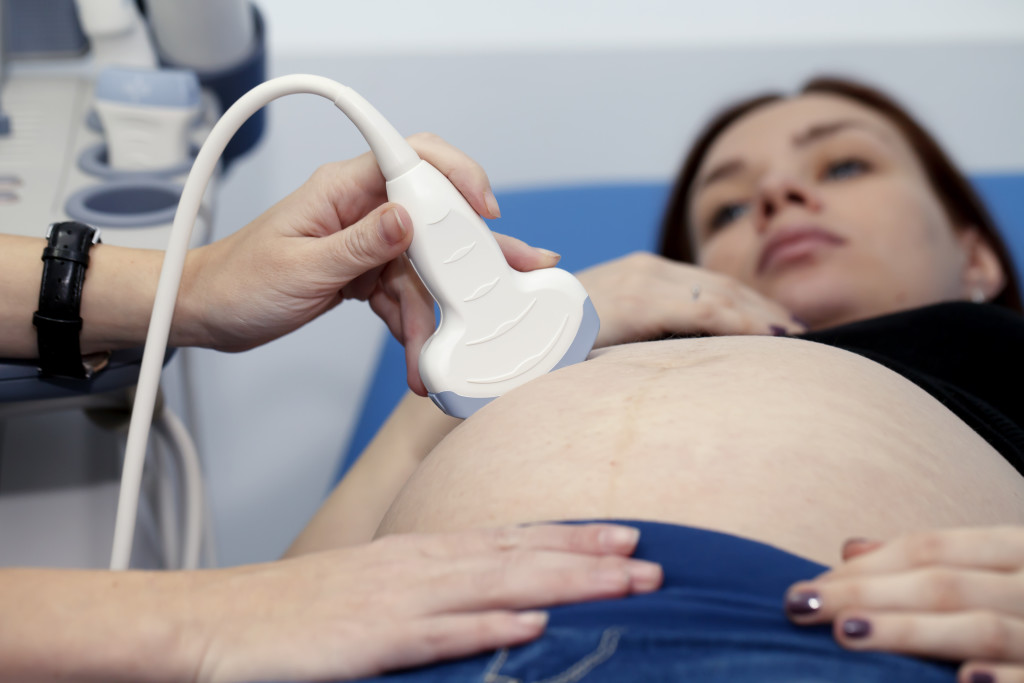
Twenty-one states are urging the U.S. Supreme Court to let Alabama ban a commonly used second trimester abortion procedure. The states filed a brief with the high court Monday asking justices to review the constitutionality of the Alabama law that was blocked by lower courts. Justices haven’t said if they’ll hear the case. The 2016 law banned the procedure known as dilation and evacuation abortions, in which the fetus is removed in pieces with forceps. State politicians used the nonmedical term “dismemberment abortion” to describe the procedure. A federal judge ruled the procedure ban was an unconstitutional restriction on abortion access. The 11th U.S. Circuit Court of Appeals upheld that decision. Several states supporting Alabama, including Kansas, Louisiana and Texas, have tried to enact similar restrictions. Republished with permission from the Associated Press
Supreme Court returns to gun rights for 1st time in 9 years
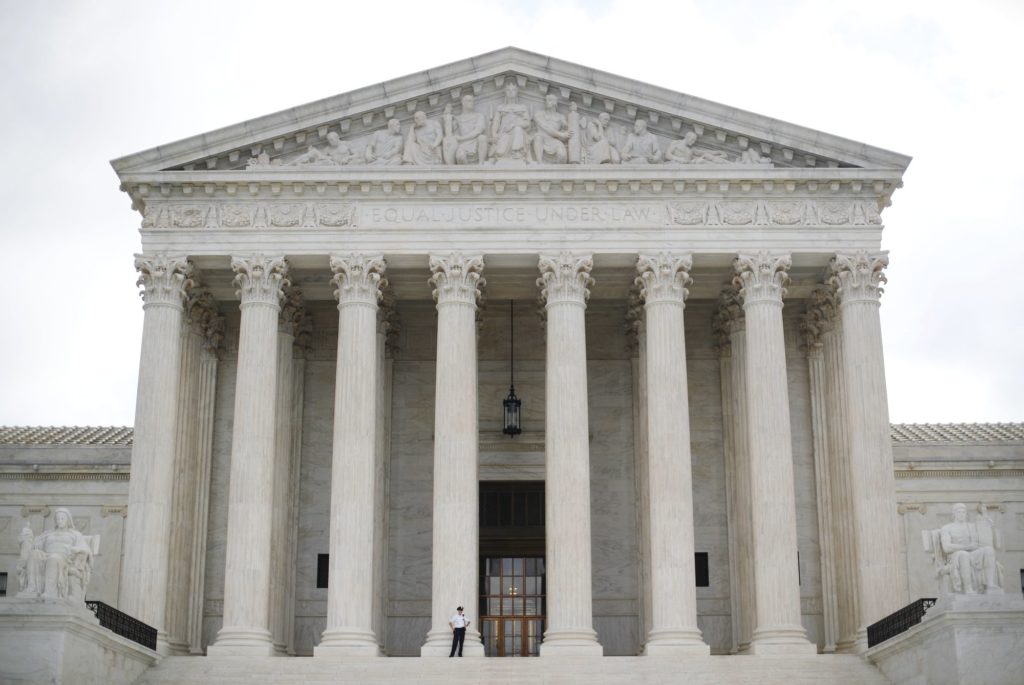
The Supreme Court said Tuesday it will take up its first gun rights case in nine years, a challenge to New York City’s prohibition on carrying a licensed, locked and unloaded handgun outside the city limits. The court’s decision to hear the appeal filed by three New York residents and New York’s National Rifle Association affiliate could signal a revived interest in gun rights by a more conservative court. The case won’t be argued until October. The challengers are represented by prominent lawyer Paul Clement, who has been urging the justices to elaborate on the extent of constitutional gun rights the Supreme Court declared in decisions in 2008 and 2010. The court had previously rejected several appeals. The court may be more willing to take on a gun rights case now that Justice Anthony Kennedy has retired and been replaced by Justice Brett Kavanaugh, who was President Donald Trump’s second high-court nominee to be confirmed. Clement says the case “is a perfect vehicle to reaffirm that those decisions and the constitutional text have consequences.” Joining in support of gun rights, 17 states said the court should break its years-long silence and use the case to define the scope of gun rights under the Constitution and the level of scrutiny, or skepticism, judges should apply to gun laws. New York’s ordinance allows people licensed to have handguns to carry them outside the home to gun ranges in the city. The guns must be locked and unloaded. The city residents who filed suit want to practice shooting at target ranges outside the city or take their guns to second homes elsewhere in New York state. Lower courts had rejected the challenge. The city’s top lawyer, Zachary Carter, urged the court to reject the case, arguing that the restrictions allowed New York police to reduce the number of guns carried in public. There are seven shooting ranges in the city and at least one in each of the city’s five boroughs, Carter said. Republished with permission from the Associated Press.
J. Pepper Bryars: While the Supreme Court deliberates, Alabama should shine the light on asset forfeiture
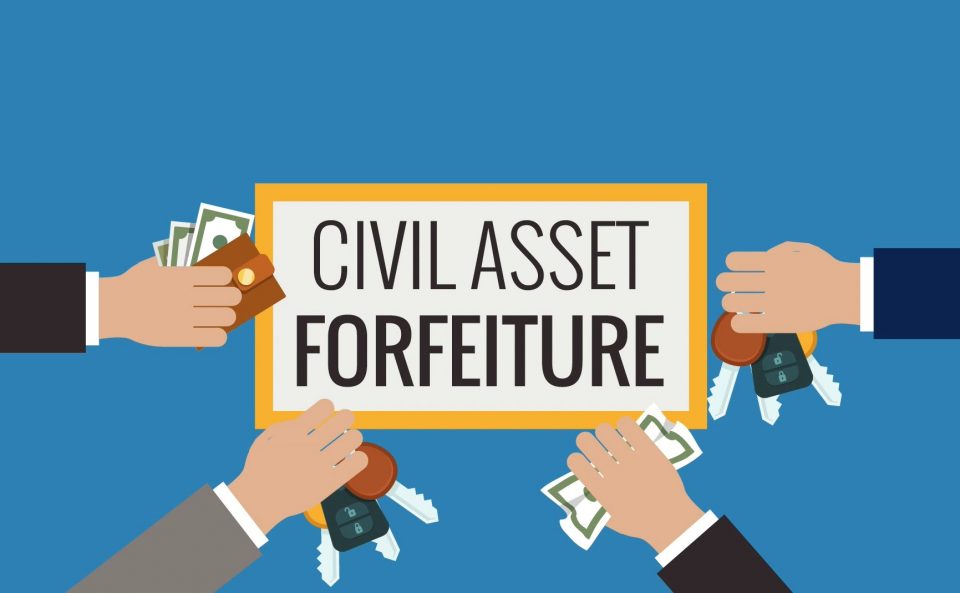
The U.S. Supreme Court recently signaled that it’s ready to limit the government’s power to confiscate things like cars, houses, and cash that prosecutors have proven, or maybe just reasonably suspect, were involved in crimes. The court heard oral arguments related to Indiana’s use of the power, known as asset forfeiture, to confiscate a $42,000 vehicle — a value nearly four times the maximum fine for the underlying crime. Specifically, the court is looking at whether the state is subject to the Eighth Amendment’s ban on imposing excessive fines. But because the justices seemed so skeptical of asset forfeiture overall, some court watchers predict that while the impending ruling may not abolish the practice completely, it could have deep and wide-ranging impacts. Including here in Alabama. Our state’s asset forfeiture law has become increasingly controversial because it allows something called civil asset forfeiture, a maneuver in which law enforcement agencies legally seize assets based upon the mere suspicion of a crime. Yes, you read that right. Under state law, you don’t have to be charged or even convicted of a crime to have your property seized. Originally intended to cut off the cash flow of drug cartels, civil asset forfeiture is a practice that is independent of personal guilt or innocence. Instead, police charge or suspect your assets of being involved in a crime, and then take them. Civil asset forfeiture flips the innocent-until-proven-guilty mantra of the American judicial system because defendants must prove their innocence to get their property back. In the case that defendants decide to hire an attorney, the legal costs can rival the worth of the assets, making such attempts both prohibitively expensive and, at times, pointless. A coalition including the Alabama Policy Institute, the Heritage Foundation, and the Institute for Justice supported efforts to reform the law during the last legislative session. But as negotiations in Montgomery waded into the details and potential unintended consequences arose, time ran out and the bill failed. Why? “It’s a complicated issue,” explained the bill’s sponsor, Sen. Arthur Orr, R-Decatur, in an Al.com postmortem of the effort. Part of that complication lies in the delicate balance between liberty and order, and how much we’re willing to cede one for the other. That’s an age-old question and one that’s not easily resolved. Proponents of asset forfeiture contend it’s an effective tool for law enforcement and helps keep drug dealers off the streets. Critics believe it goes too far and might even create a perverse financial incentive for police departments to take property from those who cannot defend themselves in court. Both sides have valid points. Another complication lies in the inability to know exactly how asset forfeiture is being conducted in Alabama. Law enforcement officials say they process forfeitures ethically, while some critics believe it’s a shadowy and unaccountable practice. That, however, should be the simplest complication to settle. The recent reform bill called for the creation and maintenance of a publicly accessible database containing relevant asset forfeiture information – what agencies were involved, what assets were seized, their value, the existence of any underlying crimes, etc. Such transparency would not only build trust in the process, it would give both sides a common set of facts to discuss rather than rumors and disputed anecdotes. Still, opponents of a database point to the fact that asset forfeiture cases are already public record since they’re all handled in one of Alabama’s 41 circuit courts. That’s true, but that’s like telling concerned citizens to look for a needle in a haystack … or 41 haystacks, actually. We should expect more from our government when private property is being seized. Another objection is, of course, the cost of maintaining such a database. But if the purpose of seizing assets is to deprive criminals, or suspected criminals, of property used in the commission of crimes, and not as a method to fund their agencies, then shouldn’t they be okay with a portion of whatever is seized going to fund a database that would build trust in the system? Meanwhile, supporters and opponents of asset forfeiture are eagerly anticipating the court’s ruling in June. Regardless of the decision, Alabama’s asset forfeiture law should take a step in the right direction… and into the light. J. Pepper Bryars, author of American Warfighter, is a senior fellow at the Alabama Policy Institute. Follow him on Twitter at @jpepperbryars.
Alabama asks Supreme Court to review abortion ruling
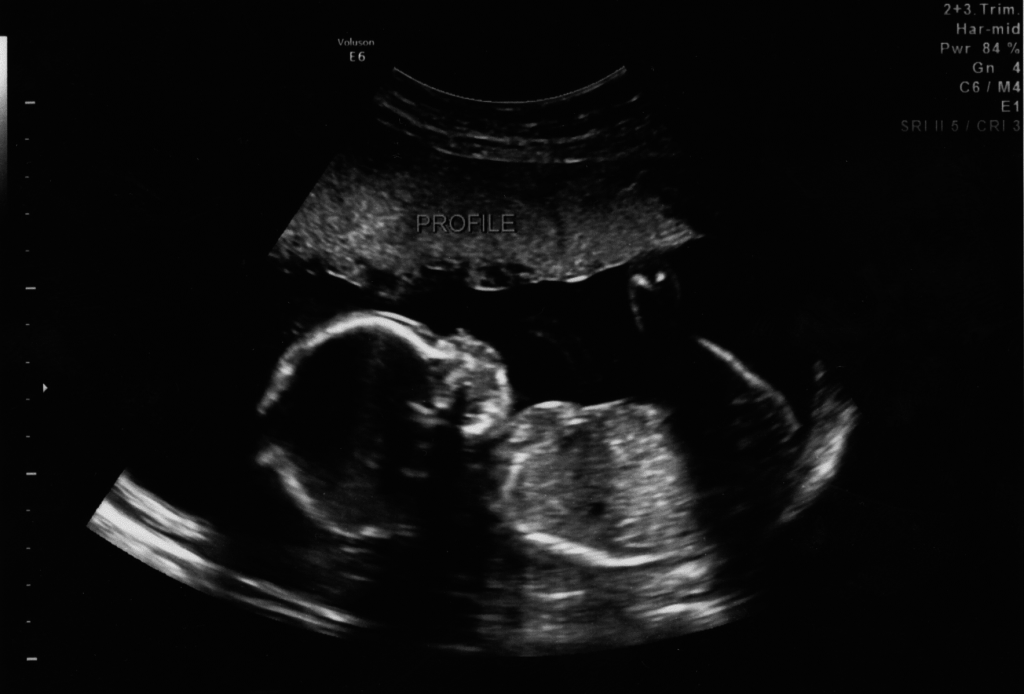
Alabama is asking the U.S. Supreme Court to review the state’s attempt to ban the most commonly used procedure in second-trimester abortions. State lawmakers voted in 2016 to ban the abortion procedure known as dilation and evacuation. A federal judge blocked the law as an unconstitutional restriction on abortion access. Attorney General Steve Marshall’s office asked the high court Thursday to review an August ruling by the 11th Circuit U.S. Court of Appeals in upholding that decision. Courts have blocked similar laws in Kansas, Oklahoma, Louisiana, Texas, and Arkansas. Court records show 93 percent of abortions in Alabama occur before 15 weeks of pregnancy. For the 7 percent of abortions that occur later, 99 percent are by dilation and evacuation. A statement from Marshall’s office calls the procedure “dismemberment abortion.” Republished with permission from the Associated Press.
Supreme Court to hear closely watched Alabama double jeopardy case
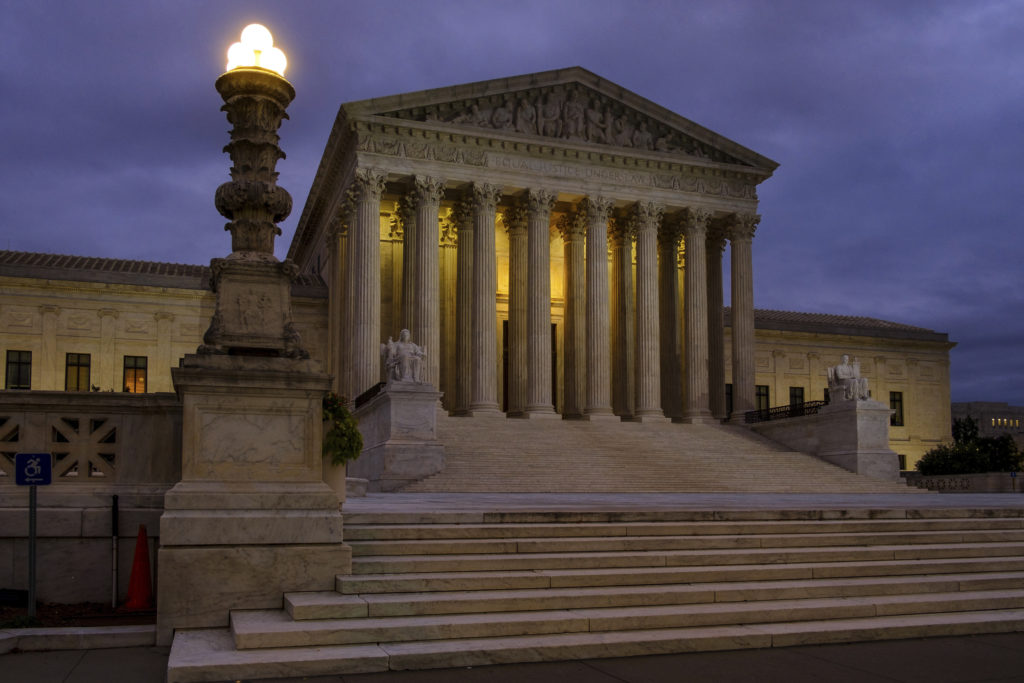
The Supreme Court is set to hear arguments about an exception to the Constitution’s ban on being tried for the same offense. The outcome could have a spillover effect on the investigation into Russian meddling in the 2016 election. The justices are taking up an appeal Thursday from federal prison inmate Terance Gamble. He was prosecuted separately by Alabama and the federal government for having a gun after an earlier robbery conviction. The high court is considering whether to overturn a court-created exception to the Constitution’s double-jeopardy bar that allows state and federal prosecutions for the same crime. The court’s ruling could be relevant if President Donald Trump were to pardon someone implicated in special counsel Robert Mueller‘s probe and a state wanted to pursue its own charges against that person. Supreme Court lawyer Tom Goldstein joked at a Washington event before the term began in October that the high court case should be called New York v. Manafort, a reference to former Trump campaign manager Paul Manafort. Trump has refused to rule out an eventual pardon for Manafort, who has been convicted of federal financial fraud and conspiracy crimes. It’s by no means certain that the high court ruling will affect future prosecutions. But Trump’s Justice Department is urging the court not to depart from what it says is an unbroken line of cases reaching back nearly 170 years in favor of allowing prosecutions by state and federal authorities. Thirty-six states that include Republican-led Texas and Democratic-led New York are on the administration’s side, as are advocates for Native American women who worry that a decision for Gamble would make it harder to prosecute domestic and sexual violence crimes. Civil rights scholars at Howard University adopt a sort of middle ground that urges the court to at least preserve the federal government’s ability to lead civil rights prosecutions against people who have been acquitted of state charges. Civil rights charges to fight crimes of racial violence have been a key tool for federal prosecutors, especially when Southern juries were unwilling to convict defendants. The most recent example the scholars cited is the successful federal prosecution of Los Angeles police officers who had been acquitted of state charges in the beating of Rodney King. On the other side, liberal and conservative groups say that the huge growth in federal criminal prosecutions in recent decades makes it urgent for the court to rein in successive prosecutions for the same crime. Reinforcing the seemingly odd alliances in play on this issue, the unlikely high court duo of Justices Ruth Bader Ginsburg and Clarence Thomas first suggested in 2016 that the topic “bears fresh examination in an appropriate case.” At least four justices — the minimum required to hear arguments — felt Gamble’s situation is that appropriate case. There is no dispute that Gamble’s arrest in 2015 for possessing a 9 mm handgun led to state and federal charges. He pleaded guilty in state court and tried to have the federal charge dismissed. When that failed, he pleaded guilty in federal court as well, with the idea of mounting the constitutional challenge that is now before the Supreme Court. Gamble is not scheduled for release from prison until 2020, nearly three years later than he would have been freed from conviction on state charges alone, his lawyer, Louis Chaiten, wrote in court papers. The relevant portion of the Constitution’s Fifth Amendment says that no person shall “be subject for the same offense to be twice put in jeopardy of life or limb.” Chaiten said the language is clearly on Gamble’s side. “The text of the Double Jeopardy Clause contemplates no exceptions to its blanket guarantee of protection from double prosecution and punishment for the same offense,” Chaiten wrote. The administration countered that the American legal system has long viewed violations of state and federal law as separate offenses, even if they result from the same conduct. The court should not “invite the serious practical consequences of categorically precluding politically accountable officials from ever determining that a separate prosecution is warranted — which would hamstring state, tribal and federal law enforcement,” Deputy Solicitor General Jeffrey Wall wrote. A decision in Gamble v. United States, 17-646, is expected by late June. Republished with permission from the Associated Press.
Alabama to ask Supreme Court to review abortion

Alabama will ask the U.S. Supreme Court to review the state’s effort to ban the most commonly used second trimester abortion procedure. Alabama Attorney General Steve Marshall’s office asked the court Tuesday for an additional 30 days to file its petition for review. Alabama lawmakers in 2016 voted to ban the abortion procedure known as dilation and evacuation. A federal judge blocked the law as an unconstitutional restriction on abortion access. The 11th Circuit U.S. Court of Appeals in August upheld the decision. Politicians seeking to ban the procedure refer to it by the nonmedical term “dismemberment abortion.” “The constitutionality of a state ban on dismemberment abortion is an important question of national significance. Litigation over similar abortion laws is pending in several other courts,” lawyers for Alabama wrote. Courts have blocked similar laws in Kansas, Oklahoma, Louisiana, Texas, and Arkansas. U.S. District Judge Myron Thompson in 2016 blocked enforcement of the Alabama law, saying the ban would cause Alabama women to lose access to abortion in the state after 15 weeks of pregnancy because of the unavailability of other methods. Alabama, with support from other conservative states, appealed the decision. The 11th Circuit in August upheld Thompson’s decision, although Chief Judge Ed Carnes wrote that “dismemberment” is an accurate description for the procedure. The Center for Reproductive Rights has described dilation and evacuation as the most common abortion procedure in the U.S. in the second trimester. According to court records in the case, 93 percent of abortions in Alabama occur before 15 weeks of pregnancy. For the seven percent of abortions that occur after 15 weeks, 99 percent of them are by dilation and evacuation. Republished with permission from the Associated Press.
AG Steve Marshall leads 13-state SCOTUS amicus brief in support of cross in public park
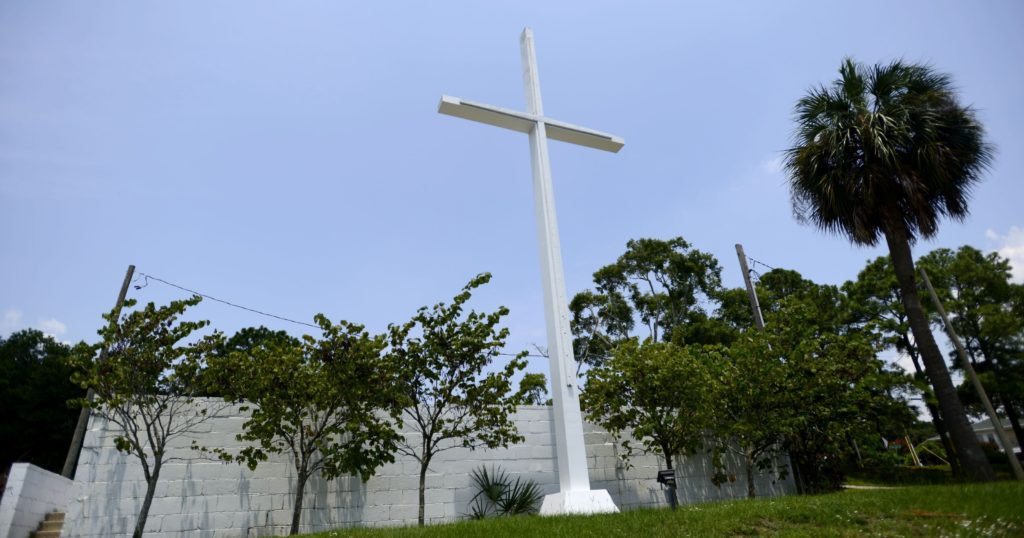
Alabama Attorney General Steve Marshall led a group of 13 states in filing an amicus brief Thursday to the U.S. Supreme Court in support of the City of Pensacola’s right to maintain a historic cross in a downtown public park. “At issue is the right of the City of Pensacola to keep a public landmark in a city park,” said Marshall. “The landmark in this case is a simple Latin cross erected in a corner of Bayview Park by the citizens of Pensacola as the nation was preparing to enter the Second World War.” Marshall’s filing, in the case Amanda Konrat’yev v. City of Pensacola, Florida, was in response to the well-known Bayview Cross in a Pensacola public park that was ordered to be taken down last summer following a controversial ruling where a federal judge decided in favor of a group of people who sued the city who claimed the cross is offensive. The City of Pensacola asked the Supreme Court last month to hear the case to decide whether or not symbols like historic crosses can stand in the public square. “For 77 years, the cross has served as a backdrop for community events and memorial services honoring veterans,” Marshall added. “Given the history and significance of this beloved local landmark, it defies reason that Pensacolans should be forced to remove it because its presence is now perceived to conflict with the Constitution’s prohibition of the establishment of religion. This distorted view of the law, which has unfortunately been upheld by two federal courts, is a serious challenge to the public’s ability to retain historic religious symbols on thousands of monuments and memorials on public property across America.” Marshall continued, “The impact of this question travels far beyond Pensacola. I was in our Nation’s Capital a few weeks ago and noticed thousands of crosses lining the hills of Arlington overlooking Washington, D.C. Should they now be ripped out of the ground because they can also be viewed as religious symbols? Even members of the federal appeals court panel that ruled against the City’s ability to display the cross have called into question the legal precedent used to challenge such displays.” Alabama was joined by Arkansas, Colorado, Georgia, Idaho, Indiana, Kansas, Louisiana, Ohio, Oklahoma, South Carolina, Texas and Utah in the filing.
Poll: Just 1 in 4 thinks Brett Kavanaugh told entire truth
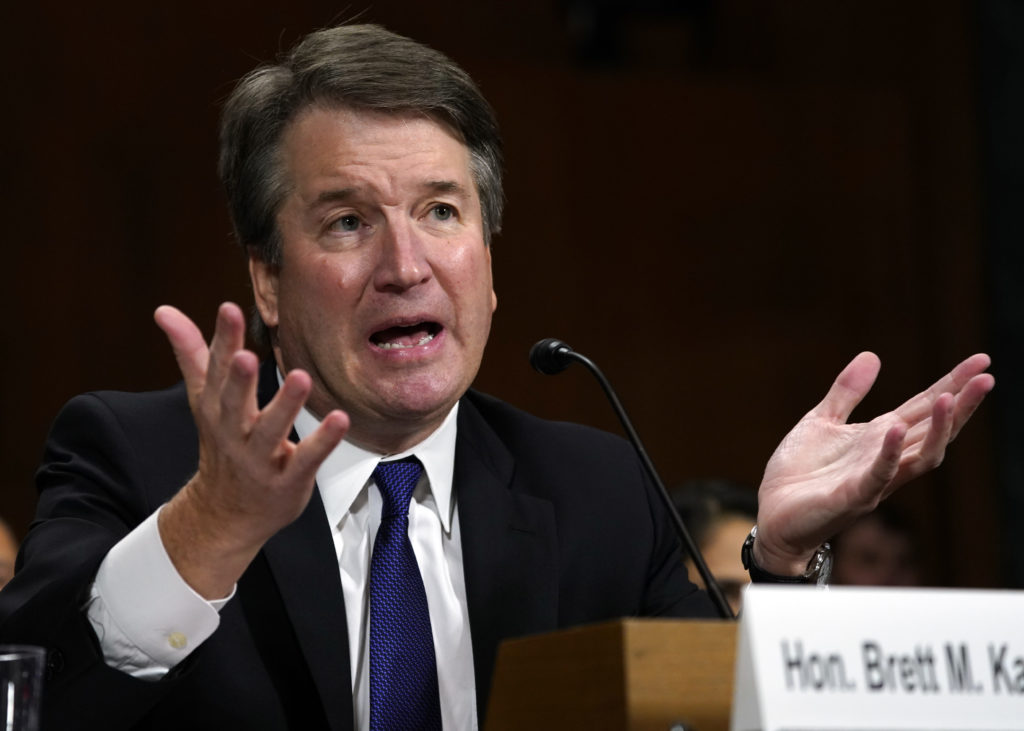
Just 1 in 4 people thinks Brett Kavanaugh was completely honest when as a Supreme Court nominee he gave sworn testimony to the Senate Judiciary Committee last month, with Republicans and Democrats holding starkly distinct opinions of his credibility, according to a poll released Friday. The Associated Press-NORC Center for Public Affairs Research survey also found that the public holds tepid views of how major players handled the extraordinary battle, which culminated Oct. 6 in an exhausted Senate’s near party line confirmation of Kavanaugh. President Donald Trump, Senate Republicans and Democrats and the FBI each earned approval from 32 percent or less of the poll’s respondents. Overall, 39 percent said they believe Kavanaugh was mostly honest but was hiding something when he testified last month before the Senate Judiciary Committee, the drama’s most unforgettable day. Another 31 percent said he was largely lying, and 25 percent said he was totally truthful. A combative Kavanaugh denied California college professor Christine Blasey Ford‘s testimony to the committee that he sexually assaulted her at a 1980s high school gathering when they were teenagers, and he rebutted classmates’ descriptions of him as a heavy drinker. The question was among several that underscored how stances over the searing confirmation battle are deeply colored by people’s political allegiances and less so by gender. Republicans hope that partisan tensions heightened by the fight will drive conservative voters to the polls in the Nov. 6 elections, when GOP control of the House and the Senate is at stake. Six in 10 Republicans, including 57 percent of men and 64 percent of women, said they think Kavanaugh was entirely truthful when he appeared before the Judiciary panel. They included Ricky Richards, who took the survey and agreed to explain his views in a subsequent interview. Richards said he believed Kavanaugh, citing repeated FBI background checks that unearthed no wrongdoing, testimony from supportive witnesses and the body language of Kavanaugh and his wife at the crucial Judiciary session. “He was angry, but he handled himself better than I would have,” said Richards, a 59-year-old engineering consultant from Clifton, Texas. He said Ford’s testimony seemed “purely scripted,” and he faulted her for not recalling some details of what she says happened to her, which experts have said is common for trauma victims. Fewer than 1 in 10 Democrats, men and women, said they think Kavanaugh was fully candid during his appearance. Just over half said he was mostly lying while the rest said he was largely truthful but was hiding something. “It’s just the way he presented himself, the way he answered questions. He was so defensive,” said Barbara Heath, a 60-year-old Democrat and former factory worker from Springfield, Ohio. “To me, he was covering up a lot of things.” Overall, 43 percent disapprove of Kavanaugh’s confirmation while 35 percent approve. More independents disapprove than support his confirmation, 35 percent to 17 percent, while the remaining respondents do not have a strong opinion either way. Forty percent of all men approve of Kavanaugh’s elevation to the high court, while only 30 percent of women do. Yet party identification washes much of that difference away: Around three-quarters of Republican men and women favor Kavanaugh’s confirmation, a view shared by only about 1 in 10 Democrats of both genders. Americans are about evenly divided over whether the Judiciary panel treated Kavanaugh fairly. In contrast, 42 percent thought the committee was unfair to Ford while 30 percent said it was fair to her. Nearly two-thirds of college-educated women said Ford was treated unfairly, a potentially damaging finding for House Republicans defending competitive suburban districts in next month’s elections. The poll also found that: The role played by Trump, who nominated Kavanaugh in July and criticized Ford and another accuser, was strongly or somewhat approved by 32 percent, about the same rating given to Senate Republicans. Senate Democrats won such approval from just 24 percent. Only 3 in 10 said the FBI did a good job. Trump hurriedly ordered the agency to perform a brief investigation of the sexual-harassment allegations against Kavanaugh and said it found no corroboration in a probe Democrats criticized as insufficient. Around 1 in 3 said that since Kavanaugh’s confirmation they have a lot of confidence in the Supreme Court. The rest have only some or hardly any confidence in the nation’s highest court. Eight in 10 Democrats, compared to 6 in 10 Republicans, said a Supreme Court nominee’s personal history and character are extremely or very important. The AP-NORC poll was conducted Oct. 11-14 by The Associated Press-NORC Center for Public Affairs Research, with funding from The Associated Press and NORC at the University of Chicago. It involved interviews conducted in English and Spanish with 1,152 adults nationwide. Interviews were conducted online or by phone among members of NORC’s probability-based AmeriSpeak panel, which is designed to be representative of the U.S. population. The margin of error is plus or minus 4 percentage points. Republished with permission from the Associated Press.
Sprint to Nov. 6: The race to frame the Brett Kavanaugh story
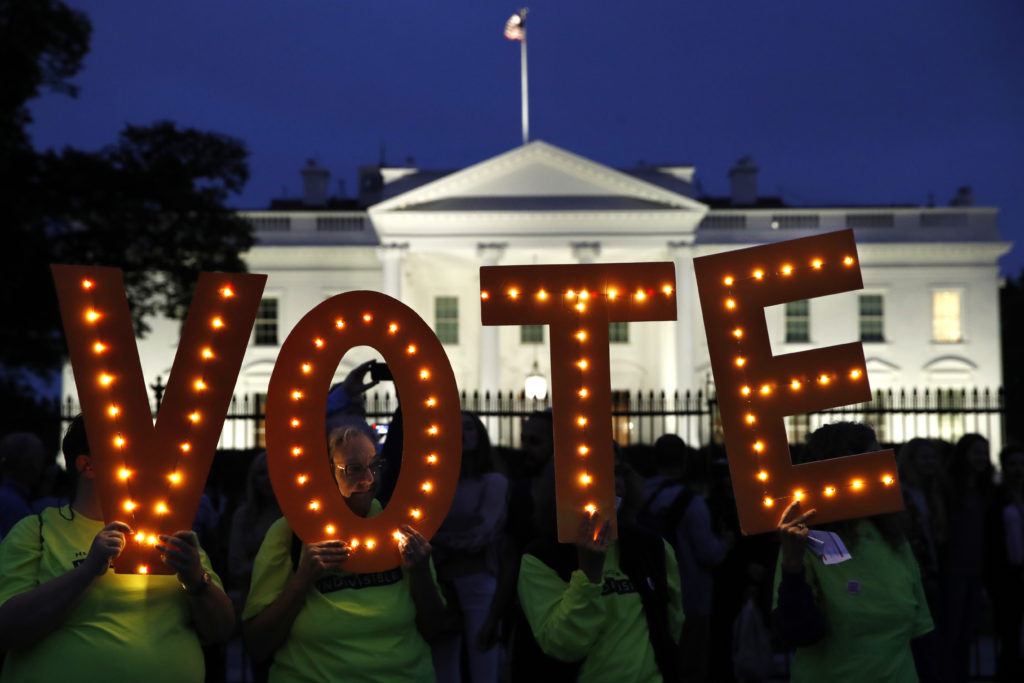
Brett Kavanaugh‘s confirmation to the Supreme Court fired the starting pistol for the final sprint to Election Day in the United States, with control of the House and Senate at stake. The nation’s reckoning with power and who to believe about sexual misconduct has generated a new anger factor among the electorate and made the Nov. 6 balloting a referendum on more than President Donald Trump. What to watch over the final four weeks: ___ KAVANAUGH, TO THE COURT Trump swore in Kavanaugh Saturday as the nation’s 114th member of the Supreme Court after a savage battle that splintered the Senate and riveted the country. Kavanaugh took his oath of office to his lifetime seat just hours after the climactic 50-48 roll call. It was the narrowest Senate vote to confirm a justice since 1881. It was a fitting result for a 100-member chamber that represents a nation deeply split over an array of issues, from health care to who should be considered an American. A yawning divide has opened in the last year over whether allegations of sexual misconduct should be enough to topple accused men from the pinnacle of their professions. Enter Kavanaugh, the appellate court judge accused by Christine Blasey Ford in emotional sworn testimony of sexually assaulting her in the 1980s, while the two were in high school. Accusations from other women followed, none corroborated. Kavanaugh denies that he ever sexually assaulted anyone. In a frequently-shouted sworn statement of his own, he decried the Senate for putting his nomination in jeopardy. Hosting a ceremonial swearing-in for Kavanaugh Monday evening in the White House East Room, Trump declared Kavanaugh had been the victim of a “campaign of political and personal destruction based on lies and deception” and added, “You, sir, under historic scrutiny, were proven innocent.” ___ THE KAVANAUGH EFFECT The Kavanaugh confirmation has blown open the midterm elections from being a national referendum on Trump’s stewardship to a raw emotional discussion over the lack of women in power and how to handle sexual misconduct allegations. With Kavanaugh’s ascension to the high court, Republicans, long dispirited by Trump’s string of scandals and the prospect of losing their congressional majorities, are whooping it up. “It’s turned our base on fire,” Senate Majority Leader Mitch McConnell said. He added Monday that the fight over Kavanaugh, particularly that his nomination was stymied by unproven allegations, injected the GOP with an “adrenaline shot that we had not been able to figure out how to achieve in any other way.” What’s unclear is whether GOP unity is enough to preserve the GOP power in Congress. The same question faces the #MeToo movement against sexual misconduct after the White House successfully argued that the Kavanaugh allegations should not be conflated with the rest of the movement. Even before the confirmation, Kavanaugh’s opponents had a comeback line, printed on the back of jackets they wore to the Capitol: “November is coming.” ___ NORTH DAKOTA Almost immediately after the Senate vote, Democrats felt the chill from faraway North Dakota. That’s the state Trump won by 36 percentage points against Democrat Hillary Clinton in 2016. And even before the Kavanaugh controversy, the Senate race there was among a handful of close contests that could decide whether Republicans keep control of the Senate, where they have a 51-49 majority. Then on Saturday, Democratic Sen. Heidi Heitkamp defied her state’s support for Trump and voted against Kavanaugh’s confirmation. Heitkamp said she was concerned about Kavanaugh’s temperament after his emotional performance before the Senate Judiciary Committee. “Without hesitation,” Heitkamp told reporters, she believed Ford. Polls have put her Republican opponent, Rep. Kevin Cramer, comfortably ahead. He told The New York Times that #MeToo was a “movement toward victimization” that had caused a backlash. “The world got to see close up how ugly it can be when you go too far,” he’s quoted as saying. ___ FRAMING THE STORY Now it’s a four-week race to tell the story. Trump has a busy campaign schedule to spread the word that the allegations against Kavanaugh were a “hoax that was set up by the Democrats” at what he’s called a dangerous time for men who can be falsely accused. “I think you’re going to see a lot of things happen on Nov. 6 that would not have happened before,” Trump said Monday as he departed for an event in Florida. This week alone, he’s expected to hold rallies in Iowa, Pennsylvania, Ohio and Kentucky. McConnell has cast Kavanaugh’s opponents, many of whom protested in the halls of the Senate and yelled at lawmakers, as “the mob.” Democrats are pointing to the Republicans’ handling of the Kavanaugh confirmation as one more reason to oppose the president who nominated him and mocked Ford. “Folks who feel very strongly one way or the other about the issues in front of us should get out and vote,” said Sen. Chris Coons, D-Del., on NBC’s “Meet the Press.” ___ GOVERNORS Look for Kavanaugh’s confirmation to remain a major issue, even though governors don’t have a direct say in the matter. Republican candidates in heavily Democratic states previously called for further investigation of sexual assault claims against Kavanaugh and their Democratic opponents said that wasn’t enough. Democrats are expected to take over some of the governors’ offices now held by the GOP, which controls a near-record 33 offices. Thirty-six states are electing governors this year, with competitive races in states where the Republican incumbents are stepping aside as they hit term limits, including in the swing states of Florida, Nevada and Ohio. The Democratic candidates in Florida, Georgia and Maryland are seeking to be the first black governors there. Republicans, meanwhile, are pushing to pick up seats in increasingly Democratic Colorado and Oregon while keeping them in most of New England as well as the South and much of the West. ___ 2020 CANDIDATES Yep, they’re already running — especially two members of the Senate Judiciary Committee who had visible roles during the Kavanaugh hearings. Sen. Cory


